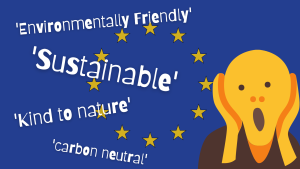- Marketing
- sustainability
Tags:
The end of greenwashing?

We’re all familiar with greenwashing by now.
Whether it’s a logistics firm claiming to be ‘carbon-neutral’, or your toothpaste tube stamped with the word ‘environmentally-friendly’ – green claims are now ubiquitous.
The sheer volume of sustainable buzzwords we now see in our daily lives has made it all a bit confusing, and for many…ultimately meaningless.
The European Commission seems to agree with this perspective and in March 2023 proposed the Green Claims Directive which aims to tackle this issue.
If your business is outside the EU, you may be tempted to think that this won’t impact you.
However, if you want to sell your products into one of the world’s largest single markets then this proposal will be very much relevant.
The Commission strikes back
Now, I don’t claim to be an expert on EU legislation. Few would!
However, I will give a brief run-down of the main points of the Green Claims Directive before explaining why panic isn’t necessary – but I would still recommend taking a closer look at the proposal to get a grasp of the finer details.
In essence, if the directive is passed by the EU parliament, it will broaden the existing definition of unfair commercial practices to include generic and unsubstantiated environmental claims or presenting required features as unique environmental benefits.
Significantly, any sustainability claims made by businesses would need to be backed up by legitimate scientific evidence and be independently verified.
If a product is marketed with the claim of being the ‘most sustainable gizmo ever’ then the manufacturer will need to have some legitimate, independent, and verifiable scientific evidence backing up that claim – which will then need verifying with a relevant authority.
Firms won’t be able to get away with cherry-picking data or conveniently leaving out certain aspects just to make their product look greener than it actually is.
Now for the scary bit; enforcement.
The relevant authorities established by the directive will have the power to investigate any misleading or unsubstantiated environmental claims. Businesses may be required to provide information, data, or documents to investigate potential infringements – and take remedial action if deemed appropriate.
For particularly egregious violations financial penalties may be imposed. The proposal specifies that penalties should be significant enough to deter future violations with the economic benefit gained from unsubstantiated claims also being a factor.
Meaning that fines could be heavy indeed.
Don’t panic!
There has been much panic already over the Green Claims Directive. Given that it is still just a proposal at this stage should demonstrate how worried some companies are.
There’s already a new term for this: ‘green hushing’ which means making no sustainability claims at all in fear of getting walloped with the legislative baseball bat.
With the severity of the legislation in mind, this isn’t surprising – but this ignores the opportunities it presents to businesses who have been genuinely striving to maximise their sustainability for years.
Having said that, if a business has been greenwashing purely as a marketing gimmick…panic may be an appropriate reaction.
Believable sustainability claims
The current confusing haze of sustainability claims affects all businesses somewhat equally – with the claims of genuinely sustainable brands having the same perceived legitimacy as those of pure ‘greenwashers’.
By virtue of its severity, the Green Claims Directive will likely blow away this haze and give consumers confidence in the sustainability claims of the products they buy.
By having clear rules and guidelines for substantiating and communicating environmental claims, the directive helps create a level playing field. Companies that can demonstrate the legitimacy of their green claims will be in a position to gain a level of consumer confidence that is very difficult to manufacture.
Sure, allocating resources to scientifically examine sustainability claims will be a challenge for some businesses. But this will offer an opportunity for real differentiation from competitors and be a powerful way to demonstrate how important sustainability is to a company.
Don’t fear the directive
There is still time to prepare and strategize for the Green Claims Directive.
For many people, environmental claims don’t mean much these days. We’re bombarded with a variety of terms on a daily basis from both businesses that genuinely engage in greenwashing and those who are genuinely making an effort.
The EU Commission’s proposal offers an opportunity to change this – to bestow a level of environmental legitimacy previously only dreamed of.
Getting compliant will be tough, but worth it.